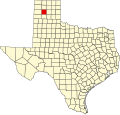Folsom, Texas | |
|---|---|
Historical unincorporated community | |
| Coordinates: 35°14′09″N101°42′21″W / 35.23583°N 101.70583°W | |
| Country | United States |
| State | Texas |
| County | Potter |
| Elevation | 3,583 ft (1,092 m) |
| Time zone | UTC-6 (Central (CST)) |
| • Summer (DST) | UTC-5 (CDT) |
| GNIS feature ID | 1379783 [1] |
Folsom was an unincorporated community in Potter County, located in the U.S. state of Texas. [1] The area is now within the city limits of Amarillo.


